We have seen a trend developing over the last few years whereby developers offer buyback schemes in Phuket whereby they offer to buy back the unit from investors. But are these promises to buy back the unit cast in stone, or should they be taken with a pinch of salt?
In this article we try to explain why developers might offer such terms to buyers, and we explore just how appealing these buybacks are.
The Phuket real estate sector remains fairly buoyant, which has resulted in more developers setting up shop here, and more properties being marketed to foreign nationals. A noticeable increase in competition between developers has seen each company offering their own incentives to attract investors.
Where once a guaranteed rental income was used to entice potential buyers, now it all about buyback schemes in Phuket, which is a guaranteed re-purchase of the property by the developer. Although the terms vary slightly with each project, the crux of the offer remains the same – developers are agreeing to buy back the owner’s unit after a set number of years (normally 5, 10 or 15).
Most of these developments also offer a guaranteed rental return, meaning, on paper at least, this type of Phuket condominium or villa investment looks quite attractive.
So What Exactly is a Guaranteed Buyback Scheme in Phuket?
A guaranteed buyback is a contract between the developer of a new project and anyone who buys a unit within that development stating that the developer will buy back the unit from the owner after a fixed period of time.
The contract will confirm the timeframe and will guarantee the price a developer agrees to pay for the unit at the end of the pre-arranged term. The guaranteed price may be either a return of the buyer’s original outlay, or it may include some capital appreciation (e.g. profit).
The terms of every buyback vary from developer to developer, and possibly even between projects from a single developer, but they typically involve the following:
- The Term: usually 5, 10 or 15 years (or even 6, 7, 8 years, etc.)
- The Offer: ranges from a buyback at the purchase price up to a 30% profit for the buyer (this will depend on the timeframe of the agreement)
- Ownership Structures: available on freehold or leasehold condos, leasehold apartments, and occasionally on a freehold or leasehold villa project
- Locations: developments tend to be in prime locations on the West Coast or with views off the east coast
- Rental Returns: most buy-back projects also offer guaranteed returns throughout the timeframe of ownership
How Good Does a Guaranteed Buyback Scheme in Phuket Sound to Potential Owners?
On the surface, buyback schemes in Phuket sound pretty good to investors. If the buyback transpires according plan, there is no way you will not make money on your investment.
Take, for example, an investor purchasing a 5 million Thai Baht condo, with a guaranteed income of 7% p.a. for the next 15 years. Since the rental would (on paper) represent a 105% return on their initial investment, that investor would essentially double their money after 15 years with the buyback.
But throughout this period they would also receive free holiday accommodation, with a free stay allowance of up to 30 days per year.
After 15 years of enjoying a healthy rental income and a holiday in Phuket each year, investors can then sell the unit back to the developer for the 5 Million Baht they originally invested.
So the total benefit would be:
- 105% return on investment
- As much as 450 days free stay
- Return of original capital
- Potential for capital gain on buyback
While this sounds like a no brainer, investors must also ask a number of pertinent questions.
Here are a few to begin with:
- Why would they offer this in the first place?
- How can they afford to do this in 15 years?
- Would this promise to buy the unit back stand up in a court of law?
- Can the owner sell the unit during this 15 year timeframe?
- Will the developer even be around in 15 years?
- Is the ownership leasehold or freehold?
- What happens if the owner passes away during the guarantee period?
Why Would They Offer These Buybacks in the First Place?
A few years ago, the concept of buyback schemes in Phuket was introduced to the island. It may have been borrowed from other dynamic property markets around the world where this arrangement has become common place.
Once one developer in Thailand started to use this to promote sales of their development, others quickly recognized the excellent marketing power of a buyback scheme.
The Phuket property market is looking especially vibrant right now, but competition is also extremely high. Using this sort of sales strategy may put them one step ahead of the competition.
This is especially true of developments which rely on agents to sell their properties for them. A property agent is always attracted by developments which are easy to sell, and most agents will not address the negatives (or potential negatives) when selling a property. Sales people must keep a positive mind set, and it is easy to be positive when presenting a property with any kind of guarantee.
No one seems to question why else, other than for marketing purposes, a developer would offer this deal. How can buying back something you’ve already profited from be a lucrative proposition? Perhaps the only way to get that answer would be to ask the developer after a few drinks.
It doesn’t seem to make financial sense from a developer’s standpoint when you consider the amount of money required to buy back units on the resort that they only completed a few years ago.
Perhaps they believe that property price inflation will be such that, after 5, 10 or 15 years – they can essentially “flip” the units for an immediate profit after buying them back.
This sounds good in theory, but there is no guarantee that the developer will be in a position to make such a massive capital outlay when the time comes.
It is also possible, when the guaranteed period is reached, that a developer has passed away, hit hard times, or moved on to greener pastures in another country. If the company does still exist, there may have been a complete change in shareholders who simply dismiss any promises made by the previous directors.
And when developers sell out a project, they tend to move on to the next one, and leave the running of the resort to a management company or the Condominium Juristic Person, also referred to as the CJP. Essentially, this means they have little, or in most cases nothing at all, to do with the resort once they have sold all the units.
Of course, it could also be that developers simply believe that no one is going to take them up on the offer. That seems like the most logical premise.
Either way, buyers are offered an apparently risk free way of capitalising on the buoyant real estate sector in Phuket, but with a “get out clause” included.
But it may be that buyers are being offered a false sense of security. They envisage little risk because they can just dispose of the condominium unit when the time comes. This is extremely attractive if the guaranteed buyback occurs within a shorter timeframe such as a 5 year or 10 period.
So How Can They Afford to Do It?
Building condos can be a very lucrative profession, especially in a buoyant property market. So rather than being an empty marketing promise, there is always the possibility a developer has every intention of fulfilling this obligation. it is also worth pointing out that some developers offer only a limited amount of units within the “buy-back program” which they may very well have budgeted for. But even budgeting for say 30% of the total units they sell is still a huge payout they will have to make when it comes time to honouring this proposal.
But let’s do the sums on how much it would take a developer to buy back an entire 100-unit condominium project. It doesn’t really matter whether it’s after 5, 10 or 15 years, the numbers are still scary.
No matter how much profit a developer made from a project, there will have to be a very high likelihood of some quick sales to even secure the financing for such an outlay.
Buying back 100 units at 5 Million Baht per unit is a staggering 500 Million Baht, which currently equates to around US$17 million.
Let’s say they are only offering buy-backs on half the units they sell, it’s still US$8.5 million. Even if they offer this on one third (US$5.7 million), one-fifth (US$3.4 million), or one-tenth (US$1.7 million), that is a significant amount of cash for the developer to come up with.
And that example is only a 100-unit development. Some projects have 200 units or more, so the financial burden of a buyback could be astronomical if a significant percentage of the owners take them up on the offer.
The Attraction of a Leasehold Unit Buy-Back Contract
Sometimes the buyback schemes in Phuket are available on a leasehold Phuket condo unit. Only 49% of the unit area of any given condo is available freehold to foreigners. Thai nationals may own the remaining 51% outright, but developers often find it more difficult to sell to Thais. That 51% allocation can instead be offered on a leasehold basis to foreign investors, which is typically done via a 30+30+30 leasehold contract, which is technically illegal.
The attraction of a buyback on a leasehold is therefore obvious. Well before the expiry of the initial 30 year lease period, the owner can simply offload the unit back on the developer.
As leaseholds are usually less expensive than freeholds (because they cost less to register), a guaranteed rental return over a fixed time period can make a leasehold seem as attractive as a freehold, if buyers are receiving identical terms on both structures.
Leaseholds become even more attractive to potential buyers if the developer is only offering the buy-back option on their leasehold units. In fact, this is an excellent way for developers to offload their inventory of unsold leasehold units.
But not every resort is structured as a condominium, with both freehold and leasehold units available. Instead the entire resort is composed of apartments, which in Thailand are only available as leasehold, regardless of the nationality of the buyer.
These projects will not fall under the Condominium Act so don’t come with the same protections as condo developments. But the attraction of a buyback within such a project remains a strong selling point to reel in buyers.
Most foreigners who buy an apartment, as opposed to a condo, do not even realise there is a difference and they don’t bother to get proper legal advice, which is a huge mistake.
Most competent lawyers would likely advise against such a purchase, but if the buyer was adamant they wanted to go ahead, would conduct stringent due diligence on the developer. And the contract between buyer and seller would be scrutinised to ensure it was as airtight as legally possible in favour of the foreign buyer.
Have Any Buy-Back Clauses Been Honoured So Far?
We do know of one developer that has honoured a buyback. However, there is a possibility that the funds used to re-purchase the units from owners came from money being collected on others projects currently under development.
In other words, it may be a case of robbing Peter to pay Paul. Such arrangements where the funds used are not from the same development (including, in some cases, the paying of guaranteed returns) can almost resemble a Ponzi scheme.
While this is a possibility, we are not certain it is the case at any development. It is, however, a legitimate risk which must be considered. We welcome any developers who have honoured buybacks in the past to contact us, so that we can set the record straight on the frequency of successful buy-back schemes.
This feedback would be especially useful if the funds being used to guarantee the buybacks are not placing other projects in jeopardy.
Can a Buyback Scheme in Phuket Be Legally Enforced?
What would the consequences be if a developer decided that they could not follow through on their obligation to repurchase a unit from the owner? Is there any legal recourse if the agreement is not honoured?
It’s a tough question, because taking any legal action would first and foremost require the developer still to be around 5, 10 or 15 years from now.
A lot will also depend on whether the contract is between the developer’s parent company or the company that has been established specifically to construct, market and sell the project in question.
Of course, and this should go without saying, the wording of the contract should also be closely scrutinised. We find ourselves saying this a lot, but this is another of those reasons why a reliable lawyer is essential when you buy a property in Phuket.
What About Real House Price Inflation? Is it Not Better to Watch Your Property Increase in Value?
This is another pertinent question to ask yourself. If you purchased wisely, buying into a Phuket property development in a high-demand area of the island, then the chances are you will be able to sell your condo relatively easily.
The following two graphs show Thailand’s house price index (blue) and condo price index (purple) over the last ten years.
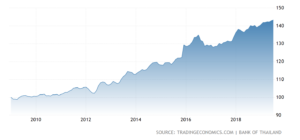
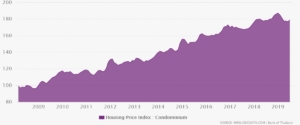
As you can see, nationwide house prices have reached a new high, while condo prices have dropped off slightly in 2019. Both of these indices show the strength of Thailand’s property market over the last decade, but in term of short-term trends, they also have an inherent bias toward the metropolitan Bangkok area, which has seen the housing market come under pressure this year.
The Phuket market is less reliant on the economic situation in the capital because it is driven more heavily by overseas investors than is the Bangkok market. In Phuket, infrastructure improvements have been ongoing for the last two decades, keeping pace with the growing real estate market.
This is one of the great attractions for foreign investors and would-be residents alike, and it certainly plays a role in keeping the market strong.
The biggest impediment to re-sales in Phuket is often that the owners are being a little greedy in their personal assessment of the value of their property. Units offered at attractive, realistic prices are usually snapped up quickly.
Depending on the outlook for the area in question, it may be more prudent to opt for a property with a guaranteed rental return or a rental pool facility, with a view of capitalising on unit price appreciation over a 5, 10 or 15 year period.
Of course, a guaranteed buyback, if it transpires, takes all the hassle out of selling a property. No need to advertise your property for sale, employ an agent, or pay anyone a commission.
It also means you don’t have to worry about market cycles. In a booming market you may wish you were getting a larger capital gain, but in a soft market you will be happy for the return of your investment.
Frequently Asked Questions About Developer Buyback Schemes in Phuket
What is a developer guaranteed buyback scheme?
It’s a sales incentive where the developer promises to buy back your property after a set number of years (often 3–5) at a fixed price — usually a slight premium over your original purchase. It’s designed to attract investors looking for low-risk returns or exit certainty.
Are buyback guarantees legally binding in Thailand?
Not always. These schemes are often supported only by a memorandum of understanding (MOU) or a separate agreement, not registered at the Land Office. That means if the developer runs into financial trouble, they may not honour the buyback — and enforcement can be difficult.
Are guaranteed buybacks a good idea when buying a Phuket property?
They can look attractive, but they’re often tied to inflated property prices and limited resale flexibility. In many cases, buyers end up paying more upfront or face unrealistic resale conditions. It’s vital to review the terms carefully and assess the developer’s track record before deciding.
What should I check before accepting a buyback deal?
-
Who is offering the guarantee — the developer or a third party?
-
Is the buyback price realistic based on market growth?
-
Is it written into the sales contract or just an informal agreement?
-
What happens if the developer defaults?
Always have a real estate lawyer or experienced agent review the documents before signing.
Conclusion
The concept of a guaranteed buyback is a very attractive proposition for anyone contemplating a real estate purchase in Thailand.
But these prospective buyers must understand that in the Thailand real estate market the word “guarantee” is often used somewhat liberally. In reality, a buyback cannot be 100% guaranteed.
Although the promise is attractive, investors must understand that there is no foolproof way to ensure that the buyback actually occurs at the time stated in the agreement.
While it may very well be a lucrative rental property and an excellent investment, buyers should accept from the outset that the guarantee of a buyback could be as thin as the paper it is printed on.
Thinking About Buying Property with a Guaranteed Buyback?
We’ll help you assess the risks, verify the developer’s claims, and find better investment opportunities in Phuket’s property market.
Get in Touch | Call Now On: +66 9484 11918
Contact us today for honest, expert advice before you buy.
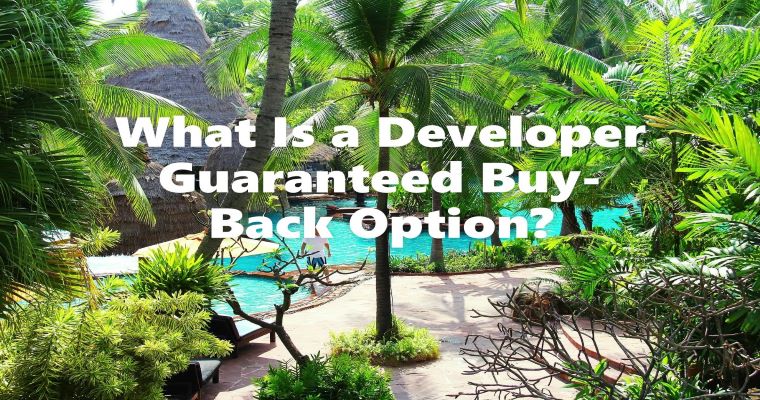

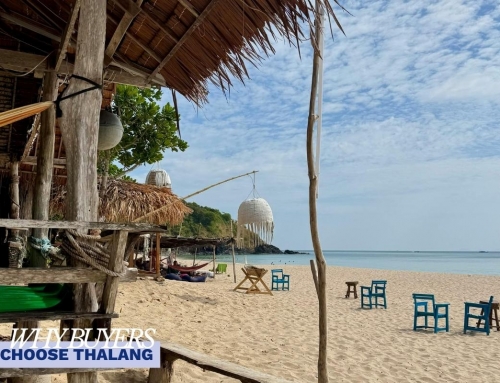
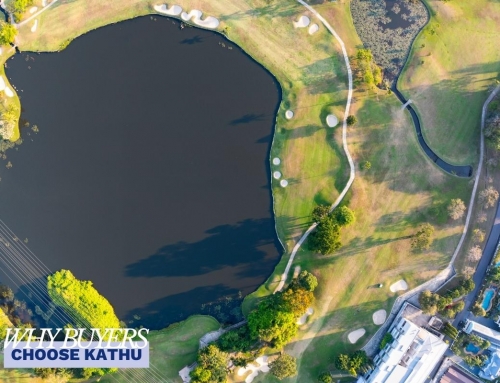

Social Contact